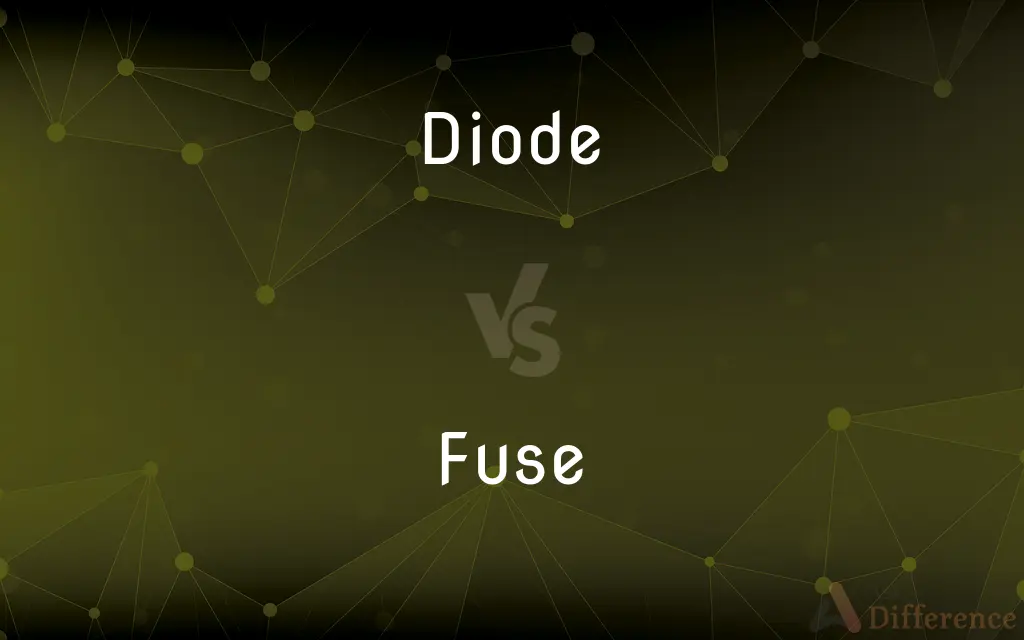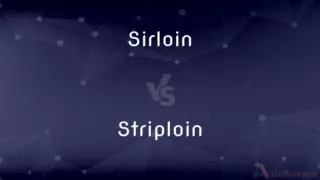Diode vs. Fuse — What's the Difference?
By Tayyaba Rehman & Fiza Rafique — Updated on March 28, 2024
A diode allows current to flow in one direction, whereas a fuse protects circuits by breaking under excessive current.

Difference Between Diode and Fuse
Table of Contents
ADVERTISEMENT
Key Differences
A diode is an electronic component that allows current to flow in only one direction, ensuring that electrical circuits function correctly and protect against reverse currents. Whereas, a fuse is a safety device designed to protect electrical circuits from damage caused by excessive current flow, which it does by melting and breaking the circuit when the current exceeds a certain threshold.
Diodes are critical in applications like rectification, where alternating current (AC) is converted to direct current (DC), and in protecting sensitive electronic components from potential damage due to reverse polarity. On the other hand, fuses are used across various electrical and electronic systems as a basic safety measure, acting as the first line of defense against overcurrents that can lead to overheating and fires.
The operational principle of a diode relies on semiconductor materials like silicon or germanium, which create a p-n junction that controls the direction of current flow. In contrast, fuses are made from metal wires or strips that melt when a specific temperature is reached due to excessive current, thereby opening the circuit to stop the flow of current.
While diodes are characterized by parameters such as forward voltage drop, reverse breakdown voltage, and current rating, defining their performance in circuits, fuses are selected based on their current rating, breaking capacity, and speed of response to overcurrent conditions.
In terms of durability, diodes can last indefinitely under normal operating conditions but can be damaged by voltage spikes or excessive current. Fuses, however, are designed to be sacrificial elements that must be replaced after they have operated since their function involves physically breaking the circuit.
ADVERTISEMENT
Comparison Chart
Function
Allows current in one direction
Protects against excessive current
Operation
Based on semiconductor p-n junction
Melts under excessive current
Use Case
Rectification, protection
Circuit safety
Parameters
Forward voltage, reverse breakdown voltage
Current rating, breaking capacity
Durability
Can be damaged by spikes, lasts if not
Must be replaced after operation
Compare with Definitions
Diode
Rectification.
Diodes are key components in converting AC to DC power.
Fuse
Circuit Safety.
Fuses are used to prevent overheating and potential fire hazards.
Diode
Unidirectional Current Flow.
A diode is used in a circuit to ensure that current flows in the correct direction.
Fuse
Easy to Replace.
Once a fuse blows, it can be easily replaced to restore the circuit.
Diode
Signal Demodulation.
Diodes can demodulate signals in radio receivers.
Fuse
Acts as a Sacrificial Element.
A fuse sacrifices itself to protect the rest of the circuit.
Diode
Protection Against Reverse Polarity.
Diodes protect sensitive electronics by preventing reverse current flow.
Fuse
Overcurrent Protection.
A fuse is installed in a circuit to protect against excessive current.
Diode
Voltage Regulation.
Zener diodes are used to maintain a constant voltage level.
Fuse
Selection Based on Current Rating.
Fuses must be selected based on the maximum expected current flow.
Diode
A diode is a two-terminal electronic component that conducts current primarily in one direction (asymmetric conductance); it has low (ideally zero) resistance in one direction, and high (ideally infinite) resistance in the other. A diode vacuum tube or thermionic diode is a vacuum tube with two electrodes, a heated cathode and a plate, in which electrons can flow in only one direction, from cathode to plate.
Fuse
A cord of readily combustible material that is lighted at one end to carry a flame along its length to detonate an explosive at the other end.
Diode
An electrical device, such as a semiconductor or electron tube, through which flow of current is generally restricted to one direction. Diodes are often used in or as rectifiers.
Fuse
Often fuze A mechanical or electrical mechanism used to detonate an explosive charge or device such as a bomb or grenade
"A mechanical ... switch is used to initiate the fuzes" (International Defense Review).
Diode
(electronics) An electronic device that allows current to flow in one direction only; used chiefly as a rectifier.
Fuse
A safety device that protects an electric circuit from excessive current, consisting of or containing a metal element that melts when current exceeds a specific amperage, thereby opening the circuit.
Diode
A thermionic tube having two electrodes; used as a rectifier
Fuse
To equip with a mechanical or electrical fuse.
Diode
A semiconductor that consists of a p-n junction
Fuse
To join (different pieces or elements) together physically, as by melting or heating
Bits of glass fused in a kiln.
Atomic nuclei that are fused together inside the stars.
Fuse
To blend or combine together
"Edison's invention strategy effectively fused research and development in a seamless process" (Seth Shulman).
Fuse
To liquefy or reduce to a plastic state by heating; melt.
Fuse
To become physically joined together, as by melting.
Fuse
To be combined or blended together
"There was no separation between joy and sorrow.
Fuse
To become liquefied from heat.
Fuse
A cord that, when lit, conveys the fire to some explosive device.
Fuse
The mechanism that ignites the charge in an explosive device; a detonator.
Fuse
(figurative) A tendency to lose one's temper.
When talking about being laid off, he has a short fuse.
Fuse
A friction match for smokers' use, having a bulbous head which when ignited is not easily blown out even in a gale of wind.
Fuse
A kind of match made of paper impregnated with niter and having the usual igniting tip.
Fuse
(electrical engineering) A device to prevent excessive overcurrent from overload or short circuit in an electrical circuit, containing a component that melts and interrupts the current when too high a load is passed through it.
Fuse
To furnish with or install a fuse to (an explosive device) Usage notes]] for noun above.
Fuse
(transitive) To liquify by heat; melt.
Fuse
(transitive) To melt together; to blend; to mix indistinguishably.
Fuse
(intransitive) To melt together.
Fuse
To furnish with or install a fuse to protect a circuit against overcurrent.
Fuse
To have been protected against overcurrent by its fuse melting away, creating a gap in the wire, thus stopping the circuit from operating.
When the bath overflowed, the downstairs lights fused, so we need a torch.
Fuse
(organic chemistry) To form a bicyclic compound from two similar or different types of ring such that two or more atoms are shared between the resulting rings
Fuse
To liquefy by heat; to render fluid; to dissolve; to melt.
Fuse
To unite or blend, as if melted together.
Whose fancy fuses old and new.
Fuse
To be reduced from a solid to a fluid state by heat; to be melted; to melt.
Fuse
To be blended, as if melted together.
Fuse
A tube or casing filled with combustible matter, by means of which a charge of powder is ignited, as in blasting; - called also fuzee. See Fuze.
Fuse
A mechanism in a bomb, torpedo, rocket, or artillery shell, usually having an easily detonated explosive charge and activated by the shock of impact, which detonates the main explosive charge. Some fuses may have timing mechanisms, delaying the explosion for a short time, or up to several days after impact. Fuses activated by other mechanisms more sophisticated than impact, such as proximity or heat, are used in modern weapons such as antiaircraft or antimissile missiles.
Fuse
A wire, bar, or strip of fusible metal inserted for safety in an electric circuit. When the current increases beyond a certain safe strength, the metal melts, interrupting the circuit and thereby preventing possibility of damage. It serves the same function as a circuit breaker.
Fuse
Electrical device that can interrupt the flow of electrical current when it is overloaded
Fuse
Any igniter that is used to initiate the burning of a propellant
Fuse
Mix together different elements;
The colors blend well
Fuse
Become plastic or fluid or liquefied from heat;
The substances fused at a very high temperature
Fuse
Equip with a fuse; provide with a fuse
Fuse
Make liquid or plastic by heating;
The storm fused the electric mains
Common Curiosities
How does a diode work?
A diode works by allowing current to flow through it in one direction, utilizing a p-n junction.
Where are diodes used?
Diodes are used in rectification, protection against reverse polarity, and signal modulation.
What is a diode?
A diode is a component that allows current to flow in only one direction.
How does a fuse work?
A fuse works by melting when the current exceeds a certain level, thereby breaking the circuit.
What happens when a fuse blows?
When a fuse blows, it breaks the circuit to prevent damage from overcurrent.
What is a fuse?
A fuse is a device that protects circuits from excessive current by melting and breaking the circuit.
Can a diode be used as a fuse?
No, because a diode does not break the circuit under excessive current.
Can a fuse regulate current flow direction?
No, a fuse cannot regulate current flow direction; it only protects against overcurrent.
What is the difference between a diode and a rectifier?
A rectifier uses diodes to convert AC to DC, whereas a diode is the component performing the conversion.
What are the key parameters of a fuse?
Key parameters include current rating and breaking capacity.
Are fuses reusable?
No, once a fuse has blown, it needs to be replaced.
Where are fuses used?
Fuses are used in electrical and electronic circuits for overcurrent protection.
What are the key parameters of a diode?
Key parameters include forward voltage drop and reverse breakdown voltage.
How do you choose a fuse for a circuit?
A fuse is chosen based on the maximum expected current and the circuit's requirements.
What happens when a diode fails?
A failed diode can either open or short, affecting the circuit operation.
Share Your Discovery

Previous Comparison
Browser vs. Grazer
Next Comparison
Sirloin vs. StriploinAuthor Spotlight
Written by
Tayyaba RehmanTayyaba Rehman is a distinguished writer, currently serving as a primary contributor to askdifference.com. As a researcher in semantics and etymology, Tayyaba's passion for the complexity of languages and their distinctions has found a perfect home on the platform. Tayyaba delves into the intricacies of language, distinguishing between commonly confused words and phrases, thereby providing clarity for readers worldwide.
Co-written by
Fiza RafiqueFiza Rafique is a skilled content writer at AskDifference.com, where she meticulously refines and enhances written pieces. Drawing from her vast editorial expertise, Fiza ensures clarity, accuracy, and precision in every article. Passionate about language, she continually seeks to elevate the quality of content for readers worldwide.














































